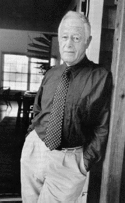Nick Antosca‘s first novel, Fires, is just out from Impetus Press, and sits in my to-be-read pile. He contributed this appreciation at my request.
 If you pass down the gospel of James Salter, you are probably a writer. Salter’s austere and humbling fiction is mostly unknown to the casual reader but canonical for a disproportionate number of widely admired authors, particularly those of a certain era: Richard Ford, Joyce Carol Oates, Michael Ondaatje, Reynolds Price, among others.
If you pass down the gospel of James Salter, you are probably a writer. Salter’s austere and humbling fiction is mostly unknown to the casual reader but canonical for a disproportionate number of widely admired authors, particularly those of a certain era: Richard Ford, Joyce Carol Oates, Michael Ondaatje, Reynolds Price, among others.
It was John Crowley, the novelist, and at the time my professor, who first spoke the name to me. In retrospect, this may have been because I was struggling to write seriously about sexual obsession and he thought I should read someone who actually knew how to do it.
In his collection of travel essays, There & Then, Salter wrote,
There is the knowledge of the senses that includes carnal happiness, and a greater knowledge that comes from intellect and reason. In the life we admire, one succeeds the other but does not dislodge it.
In the life we live, though, it is sensual knowledge, its promise or memory, that usually leads us. Intellect and reason cannot offer the same pleasure. All Salter’s fiction is about that unfortunate fact.
His characters tend not to live admirable lives. They lust, they betray, they strive to acquire. Then they look back on their lives and the most blissful memories are crimes. If not admirable, though, their lives are almost enviable, in the same way one wouldn’t mind being any of Nabokov’s characters, if only to apprehend the world with such meticulous fury.
Unlike Nabokov, however, Salter carves his stories down, always to the purest core. Every paragraph is a vein of ore uncovered. In the magnificent story “Platinum,” from the collection Last Night, a married man visiting Paris with his five-year-old daughter feels the first throb of unrest:
He could hear the couple talking. The woman, blond and smooth-browed, was in a glittering silver top. They were going out for the evening, into the stream of lights, boulevards, restaurants brimming with talk. He had only a glimpse of them setting forth, the light on her hair, the cab door held open for her, and for a moment forgot he had everything.
How skillfully and with such concision Salter pits the desired happiness against the one already lived. It’s that final clause, of course, that makes the paragraph resound — makes it a monument to everything this man stands to lose. And then the line is crossed, an affair is initiated, and it is not sordid but luminous:
He came home filled with forbidden happiness, forbidden but unrivalled, and embraced his wife and played with or read to his children. The prohibited feeds the appetite for all the rest. He went from one to the other with a heart that was pure.
And in the company of the beloved mistress:
Summer mornings with their first, soft light. Amorous mornings, the red numbers flicking silently on the clock, the first sunlight in the trees. Her stunning naked back. The most sacred hours, he realized, of his life.
I will not reveal the story’s excruciating, perfect conclusion except to say that no moral reckoning arrives. It never does in Salter’s stories. His frank sensualism might even be called amoral, but I think this is not true. It is just a different kind of morality, one that regards the experience of the senses as almost holy.
Nowhere is this more evident than in his best-known book, A Sport and a Pastime. In that novel, which takes its title and epigraph from the Koran (“Remember that the life of this world is but a sport and a pastime…”), a nameless American living in France narrates with exquisite but largely invented detail a brief, intense sexual affair between his friend Phillip Dean, also an American expatriate, and Anne-Marie Costallat, an eighteen-year-old French girl. The narrator is infatuated with both lovers, idolizing Dean (not platonically) and eroticizing Anne-Marie, but he’s also just intoxicated by sensory experience, by food and poetry and sex and everything else he would like to engrave on his memory. Intoxicated by it and helpless against its impermanence. Here he imagines Dean and Anne-Marie together:
He is watching her. Her nakedness compels him. No matter what he does, he cannot commit it to memory. It seems to be given to him in a series of revelations that are like flashes.
Of course it’s actually the narrator who’s trying to commit everything, even what isn’t real, to memory. Doesn’t matter. What’s important is that it isn’t important how much of the affair as he tells it is real. Details that Dean described to him are indistinguishable from those he invented, and so to us they’re all real in the sense that great fictions outlast the truth.
The moments Salter creates with these details, as concise and pure as scriptures, are the reason so many writers value him so highly. Like the nude in A Sport and a Pastime, his fictions demand to be committed to memory. Reading them stirs a desire not just to write with a skill equal to the author’s but to know and preserve the experience of the senses as carefully as he does. You can learn from Salter’s work. Not just about how to write but how you might prefer to live.
Salter photo found here.